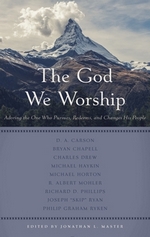 The God We Worship: Adoring the One Who Pursues, Redeems, and Changes His People
The God We Worship: Adoring the One Who Pursues, Redeems, and Changes His People
by Jonathan L. Master, ed.
eARC, 192 pg.
P & R Publishing, 2016
Read: May 15, 2016

…something basic to every person— religious or not, atheistic or theistic. Everyone is wired to worship. We are always worshiping. We never stop. You are worshiping right now. You may be worshiping wrongly, but you are worshiping. We can’t help it— God built us that way. We are always giving our hearts and our hopes to someone or to something— a leader or a relationship, a job or a future success. The question for you and me is: what or whom are you worshiping right now? Is that object of worship good enough and wise enough and strong enough to bear the weight of your life?
Those questions by Charles Drew sum up the focus of this book. Who or what is the focus of/recipient of our worship?
Most books on worship focus on the how, the why, the “style” of worship — but this collection of essays (formed from addresses at the Philadelphia Conference of Reformed Theology over many years) thinks of it in different terms — Who is The One we worship? What’s He like? Why does He want us to worship?
Jonathan L. Masters took a break from podcasting (and, I assume, other things — but I only know the podcast) to edit and compile these essays from such notables as: D. A. Carson, Bryan Chapell, Charles Drew, Michael Haykin, Michael Horton, R. Albert Mohler, Richard D. Phillips, Joseph “Skip” Ryan, and Philip Ryken.
As a collection from various years, there’s some repetition of texts considered, no controlling theme (outside the title), and a lack of purposeful connection between the individual chapters. Also, there are variations in quality between the pieces. And Dr. Mohler just doesn’t seem to fit in tone or content to the rest. Not that there was anything terribly wrong about his chapter, it just didn’t seem to match up. Whereas Dr. Phillips reminded me (he showed up twice in these pages) how much I find him compelling to read or listen to.
All the authors bring a nice mix of theology, devotion, and encouragement as they try to remind us of the character and nature of the God we worship. Each chapter is easily accessible to any reader who wants to put in a minimal effort. Even the essays that didn’t engage me immediately ended up winning me over (again, except Mohler’s).
Phillip Ryken reminds us of the place of theology in our worship — not to the side, or relegated to some dark corner. On the contrary, our worship is theological, and the two inform each other.
Do you know what the Israelites did when the Egyptians finally were destroyed? They didn’t stand on the shores of the Red Sea arguing about the sovereignty of God, worrying about reprobation or its fairness. They glorified God because they had seen how glorious he was, not only in the mercy that he had shown to them, but also in the condemnation of sin and the way that he had brought justice. They were not trying to defend the sovereignty of God; they were simply celebrating it: “I will sing to the Lord, for he is highly exalted. The horse and its rider he has hurled into the sea. The Lord is my strength and my song; he has become my salvation” (Ex. 15:1–2 NIV).
. A solid collection of essays reminding us of who our focus is to be on — The God We Worship. Whether you read this a chapter or two a day on the Lord’s Day, or in one big sitting — this is a book that will help you remember that we are to glorify and enjoy Him forever.
I received this eARC from the good folks at NetGalley in exchange for this review.
—–



Kristen
I could not refrain from commenting. Very well written!